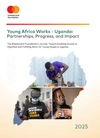A Donors' Perspective
Transferable skills. 21st century skills. Workforce readiness skills. Life skills. Non-cognitive skills. There are many terms used to describe the skills that young people require as they transition into adulthood. The What Works in Soft Skills Development for Youth Employment? A Donors’ Perspective report presents areas of consensus around terminology, implementation and assessment of these skills, and puts forth recommendations to donors, employers, policymakers and implementers.
In the face of growing youth populations around the globe, the challenges regarding employment, and the changing nature of work, young people need to develop skills which allow them to easily adapt to the workforce as well as succeed in all domains of life. This report uses the term ‘soft skills’ to describe the mix of skills, attitudes, behaviours, personal qualities and mindsets that individuals use to be successful across different situations in work and life. These skills include positive self-concept, self-control, communication, social skills, and higher-order thinking (which includes problem-solving, critical thinking and decision-making). Research shows that employers are increasingly prioritizing the need for new hires to have soft skills over technical skills, as their ability to work with others, communicate well and solve problems is critical to their success as employees.
The report makes five recommendations for developing soft skills programming at scale for young people. These recommendations highlight the need for greater and quality investments, consensus, and strategic action:
- Build Coherence Around Soft Skills: Having a shared understanding of what soft skills are and which ones should be prioritized in training will result in a better evidence base for program design. Research and programming decisions will be more effective, if there is agreement around terms with common terminology and definition.
- Deepen Reform Efforts: In order for education and training institutions to deliver soft skills training to students, a shift in mindset needs to occur. Such skills need to be prioritized and appropriate techniques adopted for skills acquisition. Governments have a key role to ensure that employers and institutions are more aligned regarding skill development.
- Catalyze Essential Partnerships: Success around soft skills development will require active, continuous dialogue and collaboration across governments, education and training providers, community-based youth programs, and employers. Civil society organizations have the agility to test and develop new approaches and liaise with different entities such as employers. Linking with educational and training institutions will allow for greater adoption of effective programming. Scaling demand-driven programs will result in greater relevance for young people.
- Improve Program Quality: To ensure programs effectively prepare youth with soft skills, reforms are needed across multiple levels of service delivery, including curriculum, pedagogy, youth program design, school/program culture and teacher/instructor preparation. Learning environments need to be structured to foster the development of softs skills. One way to do this is to include entrepreneurial training which includes many soft skills such as problem solving and critical thinking.
- Enhance Assessment and Evaluation: A lack of rigorous and nuanced research and evaluation on soft skills formation and on interventions to foster them is limiting opportunities to scale effective approaches to soft skill development for youth employment. Development of rigorous performance based assessments, and the creation of consistent, accredited measurements will permit young people to market themselves. It will also will inform implementers of the appropriate level and timing of soft skills training required for different profiles of young people.
The report was commissioned by the Youth Employment Funders Group (YEFG) in partnership with the Mastercard Foundation. The YEFG is a network of donors working together to generate and share more and better evidence-based knowledge on what works in the field of youth employment. The Mastercard Foundation is a member of the Steering Committee of the YEFG. The Foundation is proud of the its partnerships in the area of soft skills programming. Some of these partnerships are highlighted in the report.




